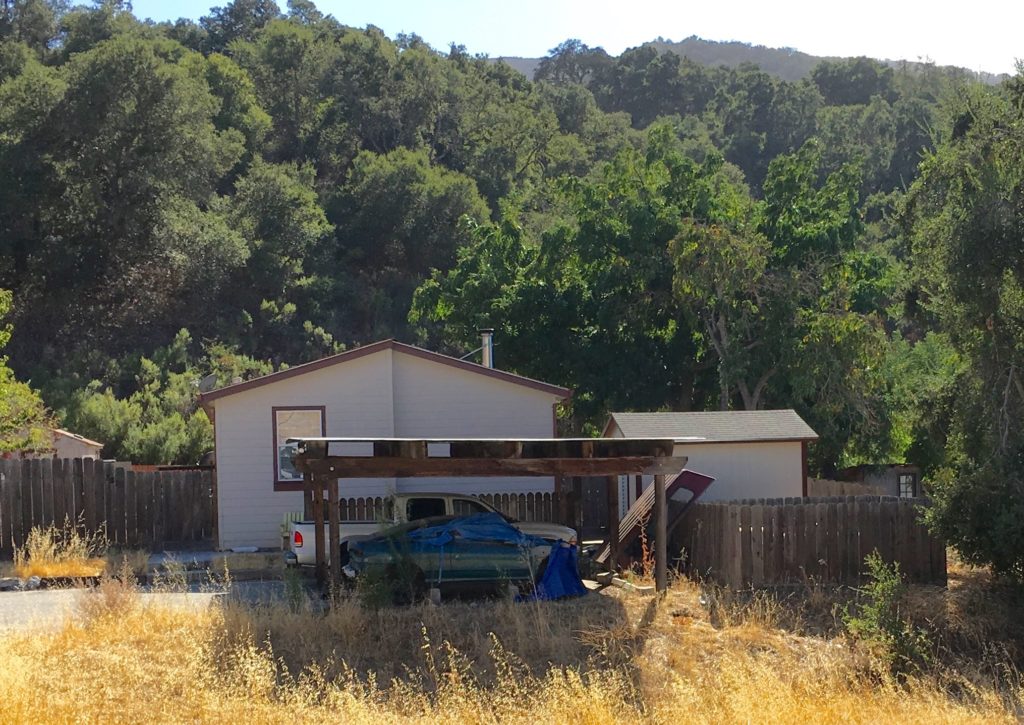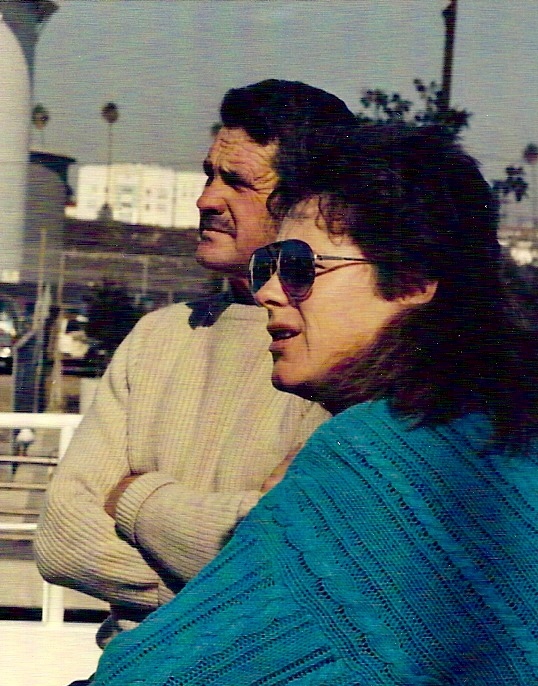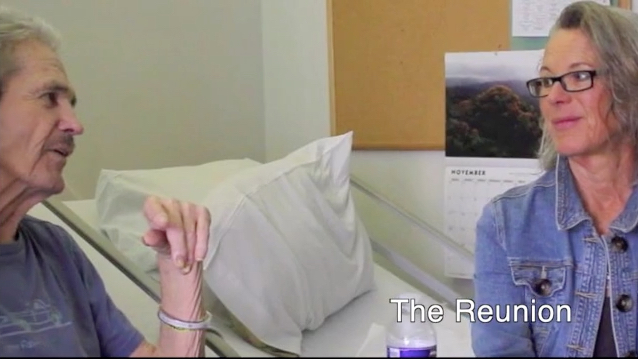 It’s funny how the brain works, how each rivulet and creek and stream leads us to the valley that must be mined. The stream today led to thoughts of my dad.
It’s funny how the brain works, how each rivulet and creek and stream leads us to the valley that must be mined. The stream today led to thoughts of my dad.
I’m trying a new practice in my travels. At each campground where I’m staying for a week or more, after my work is done each day, I drive around to see what’s around me. I may not come back to this place near the center of California, so it’s doubly important that I see what’s here.
The first day, my journey was a 17 mile trip to the nearest supermarket to stock up on provisions. I also sought out a big needle and thread to repair my awning.
The second day, I drove to a nearby national park to check out the clean, non-commercial feeling I love so much in our national forests. But dogs are not allowed on the trails. And once I read the rationale — dogs leave scents that disrupt the flow of nature, and they could well hunt down and kill the condors that are living there — I thought it a good policy.
Yesterday, we drove out to a dog park. Meh. New Orleans City Bark has spoiled me.
Today, we drove out to a vehicular recreational area and found a place to hike where we encountered none of said vehicles, thank goodness. On the way there, along the 9 miles of country road, I found my heart opening with the spectacular, breathtaking beauty around me. The two-lane road was shaded by old oak trees, and I saw ranches and vineyards laid out before me, and sunshine-sparkled pine forests covered the hillsides.
As I drove, I felt that sensation I’ve been seeking the past 41 years and rarely experience. I can’t quite explain it, but when I get it, it’s always a hot dry area that is shaded by big oak trees. It could be morning or evening, but the trees and shade and dryness are always there.
That sensation brings me back to my life in Box Canyon in Southern California when I was 21 and had moved out of the family house for the second time. My parents were divorced by then, but their anger and fights and the tension and depression in the house were still fresh in my psyche. In Box Canyon, I shared a house with my friend Jan. It was an old wooden house, probably burned down now by now, tucked under oaks, with a geography just like the one I’m in now. We had an eccentric neighbor named Jimmy who was my best friend. We cooked elaborate meals and ate them behind his house with Jan and other canyon friends. The table was slanted on the hillside, and in between each course, we’d change seats so we all were sitting forward or leaning back or sideways in equal measure. In between wine and pot lasagna, we laughed until we cried.
Years later, I read a recovery book called “It Will Never Happen to Me” about people who emerge from sick, alcoholic family homes and feel such an immense relief that they can hardly believe their fortune. I felt that way. There was no anger or demeaning comments coming my way, no guilt or pathos. I was so happy to be out of there. I was free. I was liberated.
Of course, I was not free.
In short time, I would take up the mantle of the sick family. I would drink too much and eat too much and hate and blame and isolate and think of suicide. As it would turn out, I did not have the constitution to suffer my whole life, like my parents did. I hit my bottom when I was 24 when I had an unexpected moment of clarity. I read in a magazine called Self that we should face reality. So I laid down on the bed and let the reality of my life roll over me. I weighed 275 lbs. I spent my days drinking and eating and smoking and hating, hating, hating, and watching TV. I thought: “There is no reason for me to be alive. I consume and I hate. I feel better when I eat and then I get back to hating and then it’s time to eat again, even though I’m stuffed.”
It occurred to me that I either get up off that bed and find out what’s wrong with me, or just end it with that rifle in the corner of the room. I got up off that bed and in that moment I became a spiritual seeker.
After checking out churches and chiropractic and meditation and radical vitamin regiments, I eventually found the recovery programs. I found programs for the alcohol and the food and the trauma of growing up in an alcoholic home. At the latter meetings, I cried every single meeting for at least a year. I attended other meetings for childhood abuse, and in those meetings I couldn’t even stay awake. I’d attend the meeting, grab one of the stuffed animals provided, and pass out. In time, all the memories came to the surface. I began to see that I had taken the blame for the bad things that happened to me. It was so scary to live with alcohol-induced violence and mental illness and other people’s demons that I imagined it was my fault and if I could just be a better little girl, it would stop. That’s how I survived: Self-blame, and the food. Without the ability to numb myself with food, I would have died.
 Driving along the country road today, I felt that magical sensation induced by the hot dry climate and oak-shaded road and I remembered the sheer joy of leaving the abusive home. I passed a carport outside a home, and under it was a truck and a car. The truck was nice, but the car was trashed. For some reason, in the streams of my mind, I imagined that I owned that junk car and it was being stored by my dad, who in fact had a lot of junk vehicles on his property, and in this fantasy I would come to him and say: That car is junk so let’s get it out of the carport so you can put something nice in there.
Driving along the country road today, I felt that magical sensation induced by the hot dry climate and oak-shaded road and I remembered the sheer joy of leaving the abusive home. I passed a carport outside a home, and under it was a truck and a car. The truck was nice, but the car was trashed. For some reason, in the streams of my mind, I imagined that I owned that junk car and it was being stored by my dad, who in fact had a lot of junk vehicles on his property, and in this fantasy I would come to him and say: That car is junk so let’s get it out of the carport so you can put something nice in there.
What is that symbolism?
Back in the three years of my intense recovery from childhood abuse — years that I wasn’t sure I would survive, but at the same time I was unwilling to live the rest of my life using 90% of my energy keeping down the memories — it was common practice to make a list of how your abuser hurt you. It was important for me to lose that self-hatred that consumed me. Even though the person who abused me did it without consciousness, in blind rage or other compromised states of being, they still did it, and I needed to return the blame to them.

So I sent my dad a letter around 1990 with my list. I thought we could talk it out and cry and mourn the past. I had spent the first 7 years of my sobriety keeping him company and trying to get him interested in sobriety. So I thought we were on good standing for a cleansing and new start. However, that did not happen. He was hurt and angry and basically never spoke to me again. Over the years, I tried to call and he would slam down the phone. His brother, my uncle, would ask if he wanted to see me, and the answer was always no.
As I passed that carport and the junked car, I had a sudden thought: I wish I could do all that over with all the strength and self-confidence and self-love I have now. I imagined myself in my early 40s as the person I am now. I could have forgiven the abuse and looked past it without a confrontation.
But I would not be the person I am now unless I had done what I did. I had to do what I did to stop the self annihilation and the deep depression that was taking me down. I had to save my own life. I can’t say that I’ve broken the chain of addiction and self loathing because I have no offspring. But I tell my story in case someone else who is hurting might find hope.
In November of 2012, I got an email from my cousin saying that my dad had been in a hospital for 3 years and he had dementia and he forgot that he hated me and if I ever wanted to see him again, I’d best get out to California to see him. It had come to pass that when my uncle asked if he wanted to see me, my dad finally said yes.
So I flew to LAX at the end of November and rented a Jucy camper van and I drove around to reunite with family members I hadn’t seen for decades. I stood in a parking lot in the rain listening to my other cousin relate a tragedy in the family. I saw my sister for the first time in many years and we were nervous about how we would react to each other. And there was nothing but love. I stopped by to see my aunt, and my uncle and my cousin’s wife came over to see me.
 Finally, I went to the hospital with my cousin. My dad was so feeble that my cousin and I started crying. This was the 6’4″ burly handsome man who always inserted “Big Bad” in front of his name. He was hunched over in his wheelchair and his hands curled in, and he said softly: “Why didn’t you ever come back?”
Finally, I went to the hospital with my cousin. My dad was so feeble that my cousin and I started crying. This was the 6’4″ burly handsome man who always inserted “Big Bad” in front of his name. He was hunched over in his wheelchair and his hands curled in, and he said softly: “Why didn’t you ever come back?”
My cousin brought out a CD of family movies and we watched them with my dad. His memory was sharp for those old times. It was an amazing reunion.
By January 2013, my dad was fading quickly from this earth. I flew back and stayed with a friend nearby and witnessed the outpouring of love from those who loved my dad. The Mormon bishops came by and gave him a blessing. While he hadn’t moved or talked in days, he shot up in bed when the hands were laid on his forehead. He shot up toward heaven. On another occasion during those last days, my brother was in the room reciting the recipe for one of my dad’s signature dishes. All of a sudden, from the bed, we heard an admonishment: “You forgot the onions!”
When the day came where it seemed like the end was near, none of the local family members could stand the idea of sitting with my dad while he died. So I volunteered to do that service.
I started out the evening watching TV. I thought I’d be in the room as he died and that would be that. The night nurses and orderlies were coming in to give him medications to ease the passing. One orderly came by to give his regards, saying: “So the big man is going down.” I watched TV and made and took phone calls from my friends and family.
One nurse administering the medications told me: “He can hear you.” I thought she said that so that I would watch my language. When she came and said it again, I got her message: Talk to him.
I pulled up my chair. I started out reading from the Book of Mormon, which I had downloaded to my laptop. I thought that might comfort him. But it got weird. Then I realized I had pages from a family history on my laptop, so I started reading the stories of our ancestors. Eventually I had the insight to talk to my dad about our lives together.
I thanked my dad for every good thing he ever did for me. I thanked him for surviving his own harsh childhood and for marrying my mother and for having me and my sister and brother. I thanked him for his good intentions. I thanked him for his service as a cook in the Korean War. I thanked him for working his whole life as a union lather, and making a damned good living so we never felt poor or that our home was threatened by foreclosure. I thanked him for making me feel safe from the boogey man. I thanked him for taking our family camping in Yosemite and Three Rivers. I thanked him for being an inventor and modeling for me creative thought and behavior. I thanked him for making us kids skateboards, and wooden rubber band guns, and the device that would strip the rubber off leftover copper wiring we got on his jobsites so we could turn it in for cash.
I thanked my dad for everything I could think of and told him how much I loved and admired him. The nurse had said he could hear. And maybe he could.
I talked to my dad until about 2 a.m. and I got so tired that I decided to curl up in the other bed and just rest my eyes for a few minutes. I was woken up about 30 minutes later with some hospital staff in the room, verifying that he had died. I wanted to be with him when he took his last breath, but he wanted to do that alone. I called my sister and brother and uncle, and they knew before answering their phones.
I wish I could be the woman I am now, and have it be 27 years ago, and I could do things differently. But it isn’t. And I can’t. I did what I could do at the end, and I hope it was enough.
